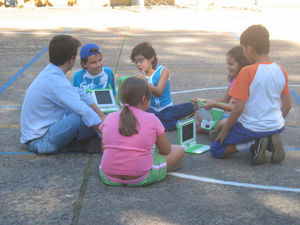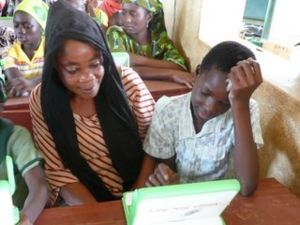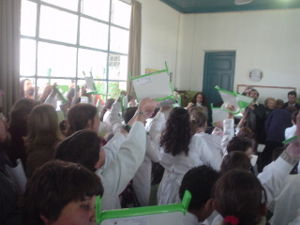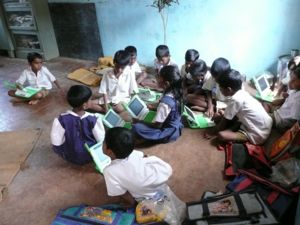Educators: Difference between revisions
| Line 36: | Line 36: | ||
* OLPC Aprendizaje por Proyectos: Mi comunidad & Abuela Ruanda/Project Based Learning in the context of OLPC |
* OLPC Aprendizaje por Proyectos: Mi comunidad & Abuela Ruanda/Project Based Learning in the context of OLPC |
||
**[[Media:ProjectBasedLearninginthecontextofOLPC.doc| both in Spanish & English]] |
|||
** |
|||
* Lesson Plan Ideas from the OLPC Team based in Rwanda |
* Lesson Plan Ideas from the OLPC Team based in Rwanda |
||
Revision as of 16:38, 24 September 2012
One Laptop per Child is an education project, not a laptop project. With connected laptops, learners are liberated to actively engage with others with similar interests in cultures of learning by doing without being limited by time or space. Children can learn by teaching, actively assisting other learners and freeing the teacher to focus her experience and expertise where most needed. (see also: education philosophy).
Educators have long recognized that children learn best when they are active, when they pursue their own interests, and when they participate in cultures of knowledge and engagement. However, until now it has been logistically impossible, except for the elites, to create such learning environments. With 1-to-1 access to connected laptops, children actively engage in knowledge construction and are not limited to passive reception of information. Each child can pursue learning in areas of strong personal interest and the classroom is not limited to a pre-determined, one-size-fits-all approach. With connected laptops, learners are liberated to actively engage with others with similar interests in cultures of learning by doing without being limited by time or space. In this way children can learn by teaching, actively assisting other learners and thereby liberating the teacher to focus her experience and expertise where most needed. Computers also facilitate appropriation of knowledge in domains difficult to comprehend with other static, non-connected materials. Domains that involve dynamics, complexity, high levels of abstraction, micro or macro size, and more become appropriable by children through expressive uses of computers. Teachers benefit as well as not only do they get to use the laptops at home for their own learning, but the connected laptop becomes a conduit for customized professional development enabling the teachers to gain access to expertise and colleagues, to pose and respond to practical questions. Moreover, with mobile, connected laptops the walls of the classroom open and the entire community becomes the classroom and virtually the whole world enters on demand. The children carry the classrooms and teachers of the world with them through the community and into their homes. Children can participate in the study of global issues while simultaneously using local context for understanding. They can fully participate as producers of knowledge and not just as consumers of materials produced by others. Connected laptops also provide a means for new models of growth. Rather than needing to rely on a centralized, standardized reform, we can develop high-quality, localized models of improved practice, and utilize the network and rich media to create mechanisms for spread. A foundation is thus created for three distinct, but overlapping, phases: enabling powerful learning in and out of school; the positive change to specific school practices; and the transformation of schools from funnels of received information to engines of knowledge construction and appropriation.
Laptops are the pencils for the digital age. The sooner we can provide high quality learning environments for all, the better and more cohesive our societies will become
The OLPC Learning Team, led by Dr. Claudia Urrea and Dr. Antonio Battro, are currently working in Colombia, Rwanda and the US respectively and provide support to countries, teams, community and children engaged in the project. The team recently released OLPC Fundamental Ideas on Learning
Each Wednesday, 2pm GMT, learning representatives and other educational stakeholders from OLPC countries, led by Dr. Urrea, meet to discussion relevant issues, updates from programs or for a presentation/discussion from a guest speaker. The chat is in Spanish, but can be translated. For a log of all chats, please see: Spanish_Chat
Background for educators
Some articles on constructionism, emergent design, high-quality education and 1:1 experiences:
- Emergent Design, by David Cavallo
- "Need for high quality education", part 1 and part 2, by David Cavallo
- Situating Constructionism, by Seymour Papert & Idit Harel
- Constructing Knowledge and Transforming the World, by Edith K. Ackermann
- One to One Connections: Building a Community Learning Culture, by Claudia Urrea
- All I Really Need to Know (About Creative Thinking) I Learned (By Studying How Children Learn) in Kindergarten, by Mitchel Resnick, MIT Media Lab
- Parent education courses
see OLPC_Research for research, papers on numerous OLPC projects across the globe
In April 2011, the Learning Team also launched "Innovation in Evaluation," you can learn more here: Innovation_in_Evaluation
Classroom Resources
- OLPC Aprendizaje por Proyectos: Mi comunidad & Abuela Ruanda/Project Based Learning in the context of OLPC
- Lesson Plan Ideas from the OLPC Team based in Rwanda
- Creating a Business, grade 6 (doc)
- Decimals, grade 4 (doc)
- Lesson Plan Ideas from Sdenka Salas of Peru
- XO in the Classroom (doc)
- INSTRUCTIVOS, FICHAS Y FASCÍCULOS desde Peru
For additional manuals, please see: Manuals
Resources developed by community groups: from Hello Laptop, from Plan Ceibal, from Peru.
Ideas and Examples
| XO Time | A weekly XO laptop challenge in local Rwandan newspaper for children to try and solve! | XO Time | |
| Journalism Camp | In Kigali, Rwanda, one group of students became journalists. Six teams from Kagugu Primary School named, designed and created their own newspapers. This allowed some to express their creativity, learn about different research, investigatory methods, better understand sentence development and structure. Newspapers they created |
Ubumwe Newspaper (doc) MWARAMUTSE KAGUGU (doc) Chantari Newspaper (doc) Kagugu Newspaper (doc) Technology Newspaper (doc) P4 Newspaper (doc). |
|
| Social School Mapping | Work with students in Kigali, Rwanda to do a holistic demographic analysis of their class, school and community | Social School Mapping Report |
How can I get involved?
Create an account on the OLPCWiki and leave us questions or comments!
Read about the OLPC Learning Vision to learn more about why we think children in developing countries need laptops and what we think laptops will enable them to do. Familiarize yourself with our ideas about content and collaboration, and the various Creative Commons licenses. As a rule, we want educational materials produced for and connected with OLPC to be free and open source.
- If you or your school want to work with XOs in the classroom (and don't yet have any), see the page for Interested schools.
- Visit our participate, contributors program, and projects pages, and see if others are working on a project that interests you. There is also a page specifically for education projects.
- Visit our sister organization, Sugar Labs, and join their wiki.
- Add yourself, or your organization, to the educator Roll Call page.
- Add an educator user box to your user page, which will add you to Category:Educators.
- Create an educational organization page for your organization, group, or school.
Contribute content
- Read about the content repository that will reside on the school servers.
- Add to the list of ideas for content that should be included in the repository.
- Contribute your content directly to OLPC by following these instructions and writing to content@laptop.org.
Create activities and collections
- Read the educational activity guidelines to learn about the features of the XO that pertain directly to educators.
- Explore our repository of activity outlines and lesson plans.
- Contribute to our collection of story-based learning activities.
- Create a new activity, either based on one of our sample learning activities or entirely from scratch.
- Upload your activity or collection to the Sugar Labs activities database.
School stories and case studies
| Porto Alegre OLPC Brazil |
Galadima OLPC Nigeria |
Ban Samkha OLPC Thailand |
|---|---|---|
File:Hiking02.jpg Ban Samkha is a rural village in northern Thailand | ||
| Cardal OLPC Uruguay |
Arahuay OLPC Peru |
Khairat school OLPC India |
Comments
"Pupils go even beyond what I can teach in the class. It's a very interesting thing to use. I personally have a better idea about teaching... We discovered that giving them time to discover something and to do it in their own way, they feel more happy and they are so excited in using it that, 'Yes, I discovered it! Yes, I can get it!! Yes, I can do this on my own!!!' Teaching is getting more interesting and less stressful." — Mr. O., Galadima School, Abuja, Nigeria




